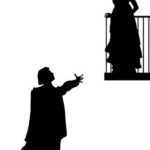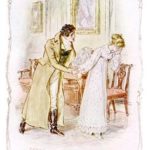I read two classics this past summer: Jane Austen’s Northanger Abbey and Dostoevsky’s Devils. I was maybe two hundred pages into Devils when I realized, with a measure of surprise, that the book reminded me of Jane Austen. Not the political revolution, of course, or the atheism and murder; the book’s conclusion, in which Dostoevsky briskly mowed down half his cast, shows everything that Dostoevsky is and Jane Austen is not. But even after that bitter end, I am sure: Dostoevsky and Austen are like each other.
The characterization in their novels has a similar texture: at once sharp and deep. Both Dostoevsky and Austen stand  outside their characters in their narration, taking the tone of an observer of rare acuity and no inclination to cover over anything. Neither ever saw a fool without observing and declaring the fact. They are unsparing. At the same time, they draw so comprehensive a sketch of their characters that it feels a little like empathy. The fools may have been lampooned, but they were at least understood.
outside their characters in their narration, taking the tone of an observer of rare acuity and no inclination to cover over anything. Neither ever saw a fool without observing and declaring the fact. They are unsparing. At the same time, they draw so comprehensive a sketch of their characters that it feels a little like empathy. The fools may have been lampooned, but they were at least understood.
A broader similarity also plays into this likeness in characterization. Austen and Dostoevsky share a keen awareness of the foibles that seam human nature. The ordinary foolishness and common weaknesses of humanity are fully understood by both writers, and finely displayed. Dostoevsky is amused by people behaving absurdly, and Austen is positively delighted. They catch the comedy of foolishness. They catch, with even greater skill, its darkness. In this Dostoevsky is stronger, but Austen captures the same truth, that workaday follies can be both laughable and destructive. They carry, sometimes, a surprising cost.
Most strikingly, Austen and Dostoevsky root their stories in society. In many novels, society – the broader community, with its rules and workings – exists as little more than background. Events play out, and characters live, at a distant remove from the community. There is no sense of what ordinary life might be like. But to read Austen and Dostoevsky is to enter a society. The shibboleths are different than our own, but the organism is the same: the requirements and prohibitions, the expectations and interactions, all the self-conscious fussiness. Austen and Dostoevsky make use of the broad conventions of society, such as who shall marry whom. Their mastery is in how they use the minor conventions. They bring forward the weight of trivialities. It doesn’t matter, really, whether you dance or don’t dance. What matters is what other people make of you for either one.
In Dostoevsky, all these things are shaded more darkly. His psychological portraits sketch the reasons of murderers, his fools descend into wickedness and ruin, his grand ball dissolves in panic as the city catches fire. The similarities between his works and Austen’s are subtle and fascinating. The differences are obvious, and ultimately more important. So profound is the divide that one cannot imagine Austen even touching the subjects that Dostoevsky wrestled. Dickens might have taken up Dostoevsky’s themes, though with far more sentiment and optimism. But if Jane Austen had written about revolution, or moral anarchy, or the psychology of suicide, she would not have been Jane Austen.
And the world would have lost something. One may prefer Jane Austen; one may prefer Fyodor Dostoevsky. Either position is fair. But it is good that Austen was herself, and not Dostoevsky, just as it is good that Dostoevsky was himself, and not Austen. Such is the diversity that makes the world rich.









































Thank you for this. All of us have unique stories to tell, and unique ways of telling them. This comparison is an interesting one. I read The Brothers Karamazov this last year, and am still trying to digest it. I like what you said here about how these authors both ground their stories in their particular societies, not just as backdrop but as part of the deeper meaning of the story. Excellent point! I certainly saw that in The Brothers Karamazov. I would like to tackle another one of his , perhaps Devils will be the one! I have to recover from Karamazov first, though. Heh. As for Austen, well, I hope to read more of hers as well. I also haven’t read Northanger Abbey, so maybe I’ll add that one to the ever-expanding list. Thanks again for this thoughtful post!
Henry James takes a similar stance, and he’s less depressing than the Russians.
Now even more so I can’t commit to reading Russians. Anton Chekov’s plays are about the heaviest I managed to get through without
ragequittingdepressionquitting.Lol. And here I am almost always open to an angsty tale 😛
I mean, I don’t like EVERY dark, angsty or tragic story, but I’ve always sort of appreciated those elements.